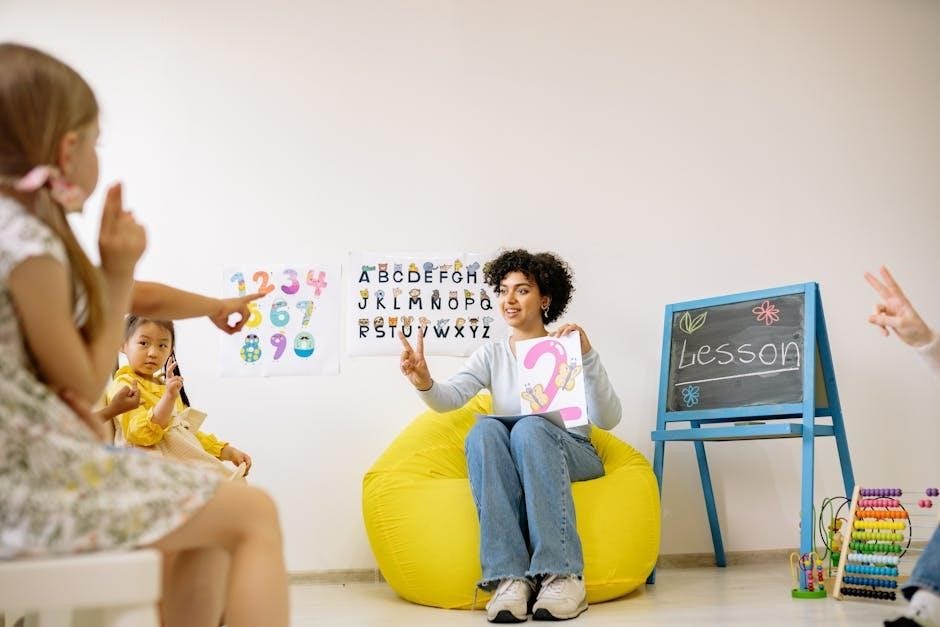
Preschool lesson plans are structured guides for educators to create engaging, age-appropriate activities that promote learning and development in young children. These plans are designed to be flexible, catering to different learning styles and developmental stages, ensuring a balanced approach to early childhood education.
Benefits of Using Preschool Lesson Plan Templates
Using preschool lesson plan templates offers numerous benefits for educators, saving time and ensuring organized, engaging, and developmentally appropriate activities. These templates provide a structured framework, allowing teachers to focus on creativity and effectiveness rather than starting from scratch. They also promote consistency, ensuring that learning objectives, activities, and assessments are aligned with curriculum goals. Additionally, templates help reduce planning stress, as they often include customizable fields for daily, weekly, or monthly schedules, making it easy to adapt to different themes or learning needs. Many templates are designed to support play-based learning, incorporating spaces for skill development, materials, and assessments. Furthermore, they enable educators to maintain a record of lessons, which can be useful for progress tracking and parent communication. Overall, preschool lesson plan templates are invaluable tools that enhance efficiency, creativity, and the quality of early childhood education.

Types of Preschool Lesson Plan Templates
Preschool lesson plan templates come in various formats to suit different planning needs. Daily templates provide detailed schedules for each day, while weekly templates offer a broader overview. Monthly templates allow for long-term planning and thematic consistency. Each type ensures structured and organized learning experiences for young children.
Daily Lesson Plans
Daily preschool lesson plans are detailed schedules outlining activities and learning objectives for each day. These plans are typically structured to include specific time blocks, such as circle time, play-based learning, and small group activities. They often feature sections for goals, materials, and assessments to ensure a comprehensive approach to early childhood education.
Editable PDF templates are widely available, allowing educators to customize daily plans according to their classroom needs. These templates may include fields for lesson themes, skill development, and engagement strategies. Daily plans are ideal for teachers who prefer a hands-on, flexible approach to instruction, enabling them to adapt activities based on student interests and developmental levels.
By using daily lesson plans, educators can ensure that each day is purposeful and aligned with broader educational goals. These plans also provide a clear framework for incorporating play, creativity, and social interaction, which are essential for preschoolers’ growth and development. Many templates are designed to be user-friendly, saving time and reducing the stress of planning engaging and effective daily lessons.
Weekly Lesson Plans
Weekly preschool lesson plans offer a structured yet flexible framework for organizing activities and learning objectives over a five-day period. These plans are ideal for educators who prefer to plan ahead while maintaining the ability to adapt to the needs and interests of their students. Many free PDF templates are available online, designed to simplify the planning process and ensure consistency throughout the week.
A typical weekly lesson plan includes sections for learning objectives, materials, and activities, often organized by day and theme. Themes such as “Colors of the Rainbow” or “Animal Habitats” help integrate various subjects like literacy, math, and science into cohesive units. These plans also incorporate play-based learning, ensuring that young children engage in hands-on experiences that foster creativity and skill development.
Weekly plans are particularly useful for aligning activities with long-term educational goals while allowing for spontaneity and flexibility; Educators can customize templates to include specific skills, such as fine motor development or social-emotional learning, making each week’s plan tailored to their classroom’s needs. This approach ensures a balanced and engaging educational experience for preschoolers.
Monthly Lesson Plans
Monthly preschool lesson plans provide a comprehensive overview of activities and learning objectives for an entire month, allowing educators to plan thematic units and long-term goals effectively. These plans are particularly useful for creating cohesive learning experiences, as they often revolve around a central theme, such as seasons, holidays, or core subjects like alphabet or numbers.
Monthly plans typically outline weekly breakdowns of activities, incorporating play-based learning, crafts, stories, and educational games. They also include space for noting skills and developmental goals, such as social-emotional growth or fine motor skills. Many free PDF templates are available online, offering customizable layouts that cater to different classroom needs. For example, some templates include sections for daily schedules, materials lists, and assessment notes, making it easier to track progress throughout the month.
These plans are ideal for educators who prefer a structured approach but still want flexibility to adapt activities based on student interests and needs. Monthly lesson plans also align well with educational standards and can be tailored to include parent involvement or special events, ensuring a well-rounded and engaging curriculum for preschoolers.

How to Create an Effective Preschool Lesson Plan
Creating an effective preschool lesson plan involves several key steps to ensure engaging and developmentally appropriate activities for young children. Start by aligning the plan with educational standards and learning objectives, ensuring activities are age-appropriate and meaningful. Consider the children’s interests and developmental stages to foster engagement and motivation.
Begin with a clear theme or topic, such as animals, seasons, or shapes, to provide a cohesive structure for the lesson. Break the plan into manageable sections, including an introduction, main activities, and conclusion. Incorporate a variety of activities, such as group work, hands-on projects, and storytime, to cater to different learning styles and keep the children engaged.
Plan for transitions between activities to maintain a smooth flow and minimize disruptions. Include assessment methods, such as observations or simple games, to evaluate understanding and progress. Finally, ensure the plan is flexible to accommodate the children’s needs and interests as they evolve during the lesson. By following these steps, educators can create a balanced and engaging preschool lesson plan that promotes learning and development.
Popular Themes for Preschool Lesson Plans
Popular themes for preschool lesson plans often center around engaging and relatable topics that spark curiosity and creativity in young children. Common themes include colors, animals, seasons, shapes, and community helpers, which are both educational and fun. These themes are versatile and can be tailored to various learning objectives, such as developing fine motor skills, encouraging social interaction, or introducing basic concepts like counting and alphabet recognition.
Another popular theme is storytelling, where children can explore their imagination through puppet shows, book readings, and role-playing activities. Seasonal themes, such as winter, spring, or holidays, are also widely used, as they allow children to connect with their surroundings and cultural traditions. Additionally, themes like space, dinos, or superheroes captivate children’s interest and make learning exciting.
These themes are often supported by free, downloadable resources, such as activity sheets, crafts, and lesson plan templates, making it easier for educators to design engaging and structured lessons. By incorporating these themes, preschool lesson plans can create a dynamic and enriching learning environment for young children.

Tools and Resources for Preschool Lesson Planning
Effective preschool lesson planning requires the right tools and resources to ensure engaging and structured learning experiences. One of the most popular resources is downloadable PDF lesson plan templates, which offer customizable layouts for daily, weekly, or monthly planning. These templates often include sections for learning objectives, activities, materials, and assessments, making it easy to organize lessons efficiently. Websites like Canva and Pre-K Printable Fun provide a wide range of free and paid templates designed specifically for preschool educators.
In addition to templates, digital tools like Google Slides and Seesaw are increasingly used to create interactive lesson plans and share them with parents or colleagues. Printable activity sheets, crafts, and educational games are also valuable resources that align with thematic lesson plans. Many educators rely on online platforms that offer pre-designed curricula and activity ideas, saving time and inspiring creative teaching methods. These tools not only streamline the planning process but also enhance the overall quality of preschool education by providing educators with the support they need to create engaging and effective lessons.

Examples of Preschool Lesson Plans
Preschool lesson plans are available in various formats and themes, catering to different age groups and learning objectives. For instance, a color recognition lesson plan might include activities like finger painting, sorting objects by color, and reading books that highlight different hues. Similarly, an animal habitats lesson plan could involve grouping toys by their natural environments, storytelling about animals, and crafts related to specific habitats.
Many resources offer downloadable PDF lesson plans that outline daily or weekly schedules. These plans often include large group activities, such as songs and stories, as well as smaller, hands-on tasks like puzzles or sensory play. For example, a weekly lesson plan might focus on a theme like “Letters of the Alphabet,” with activities such as tracing letters, singing alphabet songs, and identifying objects that start with specific sounds.
These examples demonstrate how preschool lesson plans can be tailored to meet the developmental needs of young children while fostering creativity and curiosity. Whether downloaded as PDFs or adapted from online templates, these plans provide educators with practical and engaging ways to teach essential skills.
Preschool lesson plans are an essential tool for early childhood educators, providing a structured yet flexible framework to foster young children’s learning and development. These plans ensure that activities are age-appropriate, engaging, and aligned with developmental goals. With the availability of various PDF templates, educators can easily customize lesson plans to suit their classroom needs, whether for daily, weekly, or monthly schedules.
By using these resources, teachers can save time while creating meaningful experiences for their students. From color recognition to alphabet-themed activities, preschool lesson plans offer a wide range of creative and educational opportunities. They also help in tracking progress and ensuring that children are well-prepared for future academic challenges.